I wonder if you’ve been feeling like time is speeding up lately. One moment it’s morning, and the next, the day has flown by. With the fast pace of modern life, constant work stress, and countless distractions, personal tasks can easily slip through the cracks. That’s why I believe a personal task tracker is as essential as work calendars and project management tools. It revolutionizes personal productivity by providing much-needed support in managing daily activities so that healthy habits and personal commitments don’t get lost in the chaos.

People used to keep diaries and sticky notes on the fridge to remember to call a friend or buy milk. Nowadays, we rarely pick up a pencil. Our notebooks are now files on our computers and notes on our phones or tablets. Unlike regular notes, task trackers are specialized applications designed to manage all the tasks you need to do. They list only necessary tasks and allow you to view them all in one place without any fluff. Keeping all tasks in one place means you no longer need to remember every plan for the day. Just check your task tracker regularly to ensure you don’t miss anything important. The same principle applies to habit trackers. They store the list of useful habits you’d like to cultivate or maintain so that you have them all lined up on one screen, ready to get started the minute you wake up.
5 Reasons You Need Apps to Track Your Personal Tasks and Habits
1. Prioritizing Personal Tasks
Do you often forget important dates or tasks, causing frustration for your loved ones? Many people meticulously document work tasks and meeting notes but neglect to do the same for personal responsibilities. While you may believe you can rely on your memory, “trying harder” to remember tasks will not work at all times. Your memory can fail you under stress, leading to forgotten birthdays or essential errands. It’s important to recognize the limitations of our memory, taking into account various external factors that may influence our brain. Using a digital task tracker will cover your blind spots. They will help keep track of your personal tasks, appointments, and responsibilities. No more calls from your loved ones to remind you to pick up groceries on your way home.
2. Offloading Mental Burdens
Ever noticed how juggling multiple tasks at once can leave you feeling exhausted, even if you haven’t accomplished much? In his book “Getting Things Done,” David Allen explains how our brains work and how much energy is spent on unfinished tasks. Our brains use plenty of energy on the memory function that stores our tasks, plans, and desires. When these lists exceed dozens or hundreds of items, our mental battery drains significantly. Just like managing apps on your phone to prevent overheating, we should treat our brains the same way and not overload them with unfinished tasks or open lists of plans. To avoid this, we need to offload all the information from our brains that doesn’t need to be there constantly.

3. Enhancing Focus and Reducing Anxiety
Another reason this approach is important is our brain’s limited ability to focus. The more overloaded our cache, the less we can concentrate and the more likely we are to be distracted. To prevent this, you need to quickly discard all unrelated questions and tasks from your mind into a task manager. This way you can “forget” about them as soon as you write them down until the moment you need them.
Say, something needs to be done next Thursday. There’s no need for it to anxiously pop up in your brain every now and then in fear of forgetting. Just write it down and set the reminder. You can then be confident that when Thursday comes, you’ll be notified and will do it as planned. For peace of mind, the reliability of the tool is crucial. Like an alarm clock, we set for an important event or an early morning train. Knowing it will ring on time, we sleep soundly and don’t wake up every hour in fear of oversleeping. The same principle applies here.
4. Combating Procrastination
Remember: The most unpleasant consequence of poor planning and task management is procrastination. Without task tracking, it feels like we have plenty of time to postpone the unwanted to-do for a bit longer. In reality, however, tasks pile up, eventually leading to panic and stress. Sound familiar? I’ve been there, and it’s painful.
5. Fewer Things to Remember
The digital aspect of task management and habit tracking, as opposed to paper notebooks and diaries, makes it easier to check and track them on the go. Not to mention fewer things to remember, as you don’t need any additional items to carry along—your phone is always with you.
The Role of Task Trackers for Personal Productivity
In my view, the main benefit of task trackers in modern life goes far beyond mere to-do lists and lies precisely in the points described above. These digital assistants help declutter your mind and prioritize your tasks, enabling you to focus on what truly matters. Embracing a task tracker allows you to tackle your day with confidence and ease, ensuring that you are always in control of your schedule and responsibilities. Since these applications are digital, you don’t have to worry about taking them with you. You already have your phone with you all the time. The technological aspect also provides reliability. With digital reminders and sound notifications that will remind you of the exact time and location, so you can focus on doing the tasks—not on remembering them.
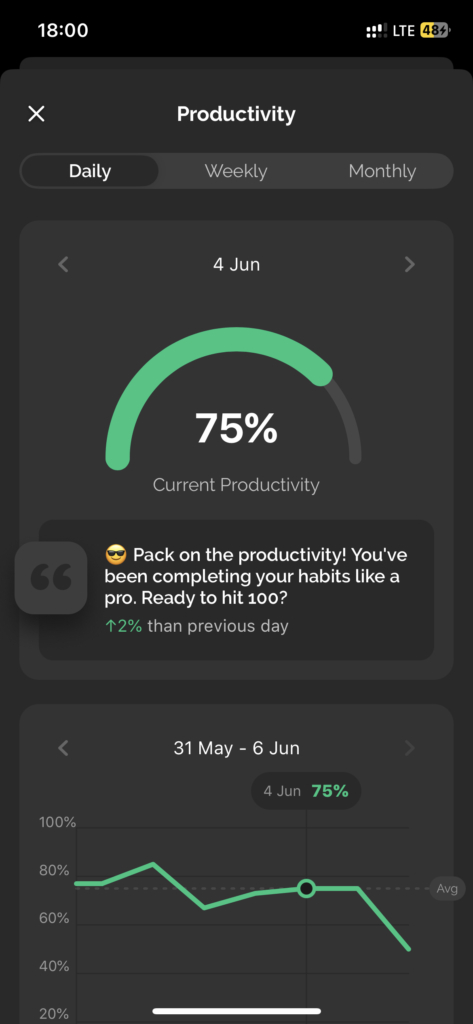
Benefits of Use of Task Trackers & Habit Trackers
My Experience
If you need proven methods of managing high task loads, here’re some examples from my experience. My current workload is about the equivalent of 1.5 full-time jobs. I have a daily average of 5-10 meetings and managerial responsibilities for 2 teams (20+ people). Plus, personal and household tasks, a coaching program that takes a minimum of 30 minutes a day, as well as my daily routines. This includes home workouts, brain training exercises, reading, and learning a new language—24 habits in total.
Needless to say, I don’t even attempt to remember all of that daily. Instead, I use task and habit trackers to list and track all my daily tasks. Each task is prioritized and scheduled, ensuring that I can focus on a task, in this case, writing this article, without worrying about missing other important activities. From conducting work research to taking out the trash, as well as useful habits I am cultivating, like daily walking or meditation – I write everything down to unload from my head.
Examples of tasks you can track
Task trackers are incredibly effective for managing one-off action items and setting reminders for upcoming tasks. Habit trackers help automate the routine part of your day, like daily workouts, listening to audiobooks, or journaling. The tracker sends me timely reminders if I need to remember monthly tasks such as bill payments or weekly tasks like sessions with my therapist. The same goes for birthdays and important events. Tracking seemingly unimportant tasks like doing my laundry or picking up groceries not only ensures that I won’t run out of fresh towels or certain food items but also helps reduce the cognitive load, freeing up my mental energy for creative and productive work.
Categorizing and Prioritization
Finally, task trackers help me categorize tasks by urgency and importance, making it easier to decide what to tackle first. This prioritization ensures that if things get too hectic, I will spend my time on tasks that offer the most significant benefits first. Yet, those I put on pause or throw into a “less important” bucket are not discarded completely, as I can also keep track of them and push them back in time instead of forgetting them altogether.
The Right Motivation To Use
Now, having said that, I’m not a robot, of course. I am a mere human being, and I still miss out on things like everyone else. Yet, I can’t imagine completing even one-third of the things I do daily if I left it to chance instead of planning and tracking them using dedicated tools and practices. After all, I am not talking about being perfect but about aiming for excellence and achieving the maximum you can.
For instance, my habit tracking app indicates that top users complete 75% of their intended habits. This corresponds to the screenshots I provided below. Even on my good days, I manage to complete about 75%, not 100%. But I confidently believe that doing even that would lead you very far in the long run. So, when trying new approaches for productivity, like implementing a task or habit tracker, don’t make it a tool for beating yourself up for all the things you wrote down and didn’t complete. Instead, always give yourself credit for taking steps towards a more productive and fulfilling life. You’ll see how you start accomplishing more this way.
Tools To Track Personal Tasks and Cultivate Useful Habits
I’ve been using task management apps for over a decade now. During that time, I kept changing them every few years once I felt that the ones I was using didn’t serve me well anymore. Last year, I sensed I needed to refresh my apps yet again, so I did thorough research. I dedicated a few weeks to testing different apps available on the market to see which one would fit my purpose best. So, if you don’t have spare time for such research, you can start with trying the two I use. Both apps work wonders for me, so big chances are, they are going to work great for you as well. However, if relying on someone’s opinion and taste isn’t for you – then doing the same kind of market shopping and examination would be ideal. In my next post, I will elaborate on how you can choose the best app, while here I’m providing my personal picks in the categories of to-do lists, task management, and habit tracking.
1. Todoist App – Task Manager and To-Do List App
After downloading and testing a couple of dozen task trackers, I’ve picked Todoist because of its combination of simplicity and functionality. The interface is fairly basic, which is rather a plus as it doesn’t distract the user from the app’s main purpose. Using hashtags, you can break things down by categories and easily navigate the tasks with an intuitive UI. Todoist provides both mobile and desktop versions so that it is easier to manage tasks from multiple devices. The ease of use and versatility allow staying on top of your game of personal productivity.
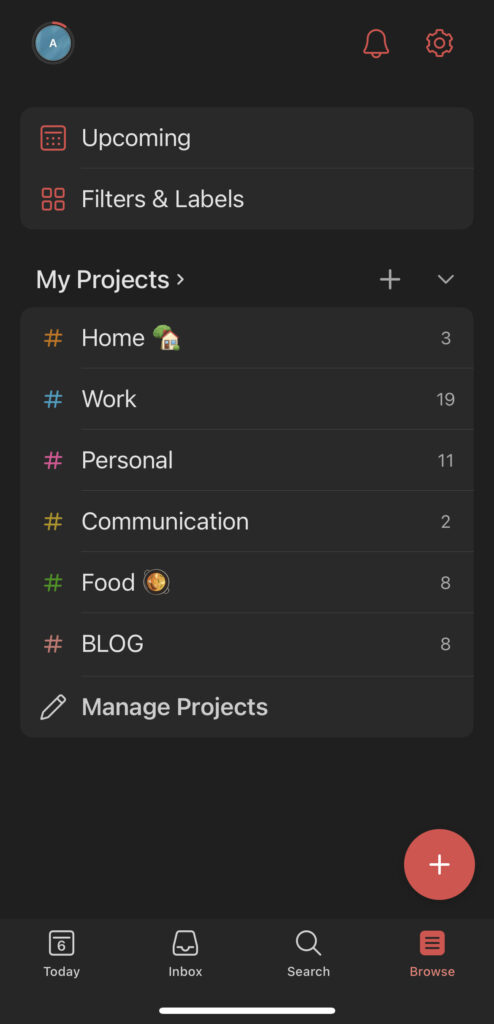
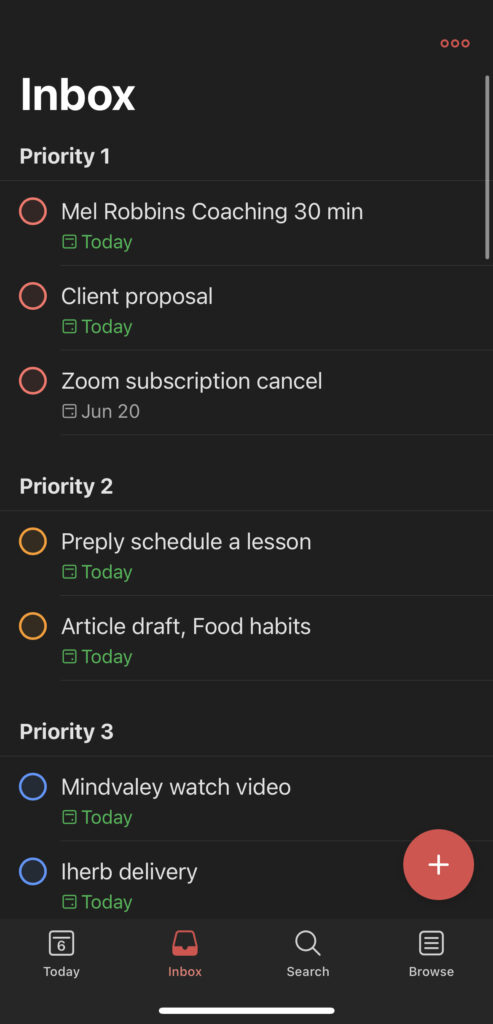
Productive – Habit Tracker, Daily Routine & Goals Planner
In contrast to Todoist, the Productive app features a very appealing UX, so that crossing out habits daily feels even more satisfying. You can choose some pre-created habits or create your own from scratch, assigning colors and icons for the best personal associations. You can also participate in various challenges alongside other users to add an element of competition to your habit-tracking game. All habits are grouped by the time of day you want to do them—morning habits appear in the morning, then switch to day and evening habits automatically as the day goes by. An amazing tool to stay consistent with your multiple habits over time.
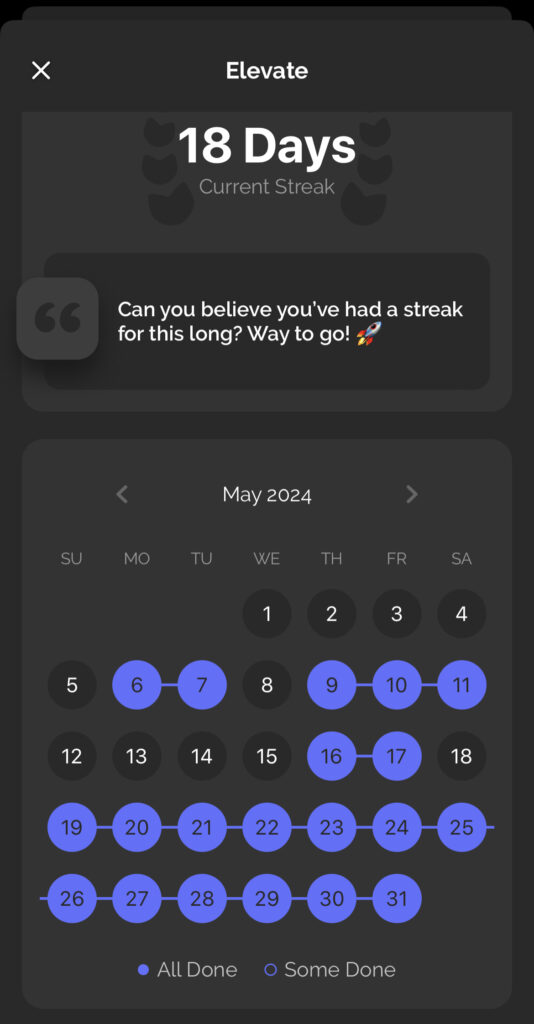
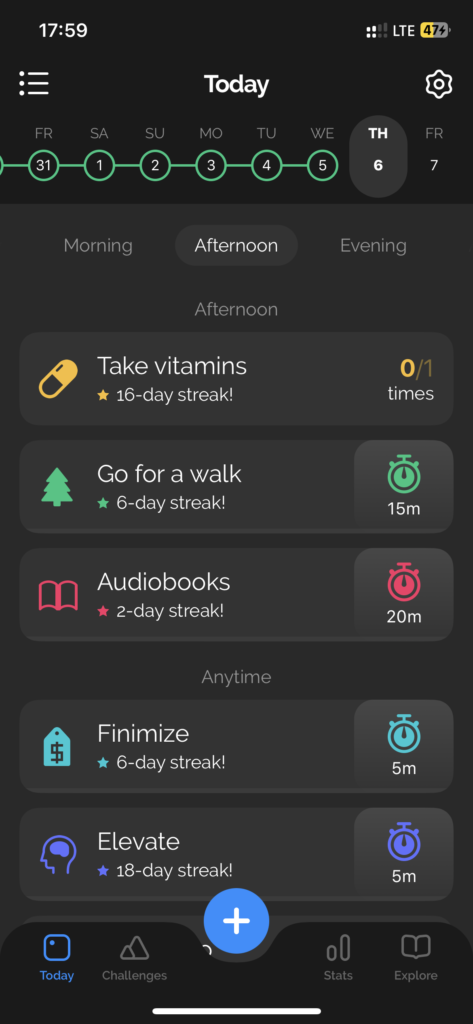
Conclusion
Picture starting each day with clarity and focus, knowing exactly what you need to accomplish. Task trackers bring this vision to life by organizing all your tasks in one accessible place, while habit trackers help keep track of your daily routines and consistency. Adopting a task tracker transforms how you manage your time, tackle your tasks, and pursue your goals. It’s more than just a tool—it’s a companion in your journey toward greater productivity and fulfillment.
Whether you’re a freelancer, a busy parent, or a budding entrepreneur, a task tracker can help you take charge of your day, ensure nothing gets overlooked, and bring you one step closer to achieving your dreams.





Leave a Reply